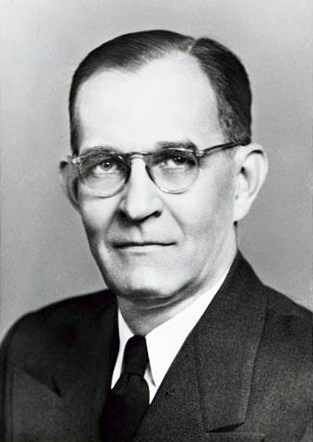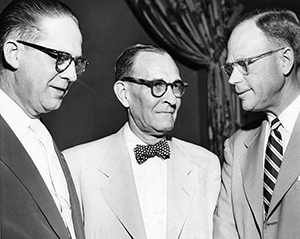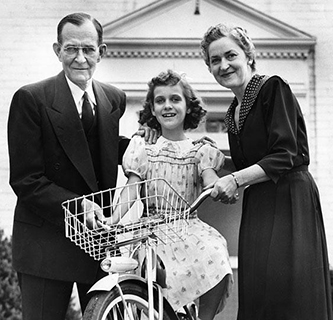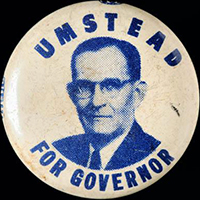13 May 1895–7 Nov. 1954
See also: William Bradley Umstead, Research Branch, NC Office of Archives and History, Merle Umstead

William Bradley Umstead, attorney, congressman, and North Carolina governor, was born on a farm in Mangum Township, Durham County. His mother, Lulie Lunsford Umstead, the daughter of a prosperous farmer, was active in civic and religious affairs in her community. His father, John W., was a farmer, legislator, and longtime member of the Durham County Board of Education. William B. Umstead spent his early childhood on a farm, where he performed all the duties expected of the average country boy. His prized possession was a black mare named Robbie, whom he raised and kept until her death at age thirty-three.
After completing nine years at Mangum School, he attended Durham High School. In 1916 he was graduated from The University of North Carolina, where his fellow students recognized his debating prowess, skill in campus politics, and fondness for quoting poetry. From his undergraduate days until his death, Umstead loved the university and was never happier than when in its service. In recognition of this interest, he was chosen president of The University of North Carolina Alumni Association and a trustee of the Consolidated University.
Umstead taught school in Kinston for one year before beginning active duty in the army. As a second lieutenant in the 317th Machine Gun Battalion, a part of the "Wild Cat" Division, he served overseas for almost a year during World War I. A few months after his discharge in March 1919, he entered law school at Trinity College (now Duke University). Receiving a license to practice law in August 1920, he launched his legal career in Durham in July 1921.
He entered politics in 1922, when he was elected prosecuting attorney of the Durham County Recorder's Court. After serving for four years, Umstead won the office of solicitor for the Tenth Judicial District. His popularity with voters in the Sixth Congressional District earned him a seat in the U.S. House of Representatives in November 1932. In Washington he took a special interest in rural electrification, soil conservation, and the Farm Home Administration. He was instrumental in securing passage of a bill appropriating funds for enlarging facilities at the Tobacco Experiment Station in Oxford, N.C., for the study of tobacco wilt and other diseases. As chairman of the subcommittee on appropriations for the Navy Department, he introduced several appropriations measures and led the fight for their passage on the House floor.

At the end of his third term Umstead resigned his seat and resumed his law practice in Durham. In 1944 he returned to the political arena as manager of the gubernatorial campaign of R. Gregg Cherry of Gastonia. Following Cherry's election, Umstead accepted the chairmanship of the state Democratic executive committee, a position he held until November 1946. Early the next year Governor Cherry appointed him to serve the unexpired term of the late senator Josiah W. Bailey. Seeking a full Senate term in 1948, Umstead faced a formidable opponent in former governor J. Melville Broughton. Umstead's loss by a small margin was the first and only defeat of his political career.
Returning to Durham in November 1948, he practiced law until the spring of 1952, when he received the Democratic nomination for governor. Elected by an overwhelming majority, he took the oath of office on 8 Jan. 1953. In his inaugural address he submitted several recommendations to the General Assembly: a 10 percent salary increase for public school teachers and administrators retroactive to 1 July 1952, passage of a bill requiring mechanical inspection of all motor vehicles in the state and establishment of a drivers' training program in every public high school, submission of bond issues to construct facilities for the treatment and education of people with mental illness and to build additional school facilities, and a statewide referendum on whether to legalize the sale of intoxicating liquor.
One of Umstead's chief interests was reorganization of the State Board of Paroles, a recommendation approved by the 1953 General Assembly. He lost no time in appointing the three-member board and conferred with it frequently on the adoption of new policies that stressed uniform and fair parole consideration for prisoners in the state's penal institutions.

When the U.S. Supreme Court ruled in the landmark Brown v. Board of Education decision of 17 May 1954 that "the doctrine of separate but equal has no place in the field of public education," Umstead's calm reaction was in the state's tradition of reasoned moderation. He reluctantly accepted the decision and appointed a nineteen-member commission, chaired by Thomas J. Pearsall of Rocky Mount, to study the school situation and submit its recommendations to the 1955 General Assembly. Largely because of Umstead's leadership on this issue, irresponsible and intemperate actions were averted.
Probably his most significant appointment as governor was that of Sam J. Ervin, Jr., of Morganton, a University of North Carolina classmate who was then an associate justice of the North Carolina Supreme Court, to fill the unexpired term of Senator Clyde R. Hoey when he died in May 1954. Ervin held his Senate seat for twenty years, gaining national prominence as chairman of the Senate Select Committee on Presidential Campaign Activities, which investigated the widely publicized Watergate affair in 1973 and 1974. Earlier in his term Umstead had appointed Alton A. Lennon of Wilmington to complete the unexpired term of U.S. senator Willis Smith of Raleigh following his death on 26 June 1953.

Physically frail, Umstead spent several months of his abbreviated term as governor in a hospital bed. Two days after his inauguration he suffered a heart attack and had deep chest congestion verging on pneumonia. Admitted to Watts Hospital in Durham on 10 January, he was unable to return to his office until 21 May. Against the advice of physicians and friends, he doggedly discharged his responsibilities as chief executive, often discussing issues of state with legislative leaders and executive department heads from his bed in the Executive Mansion. After three weeks' hospitalization in October 1954, Umstead returned to Raleigh on the twenty-fifth. When a severe cold failed to respond to treatment, he was again hospitalized. His cold quickly turned to pneumonia, and he died of congestive heart failure. Funeral rites were held on 9 November at Trinity Methodist Church, Durham, where Umstead had been an active lay leader; burial was in the Mount Tabor Methodist Church cemetery near his home community of Bahama in Mangum Township.
Although Umstead lacked the charisma and boldness of a colorful leader, his courageous devotion to duty and his intense concern for the state's welfare served as a commendable example for his successors.
He married Merle Davis of Rutherford County on 5 Sept. 1929, and they had a daughter, Merle Bradley. A portrait of Umstead hangs in the Executive Mansion.